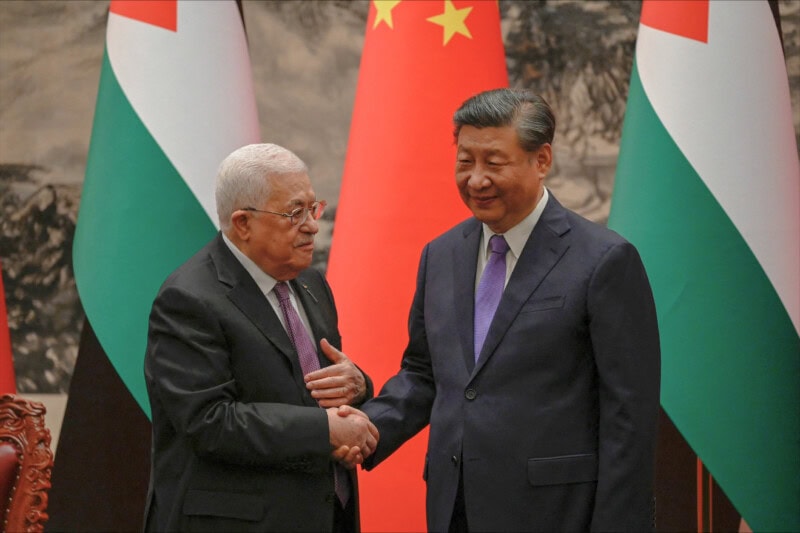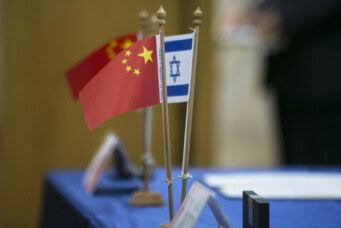China Tests the Water in Palestinian Diplomacy
While the ramifications of the recent unity agreement signed in Beijing by multiple Palestinian factions remain to be seen, it is evident that China has stepped up as a leader in the region

Palestinian President Mahmud Abbas shakes hands with China’s President Xi Jinping after a signing ceremony at the Great Hall of the People in Beijing, China June 14, 2023. JADE GAO/Pool via REUTERS – RC2ZI1AN305Y
Said Abdel Salam Haniyeh, son of the recently assassinated head of Hamas’ political bureau, Ismail Haniyeh, emphasized national unity as a top priority for all Palestinians in the eulogy he presented for his father’s passing. “Our confidence is great in the Palestinian people, and the Palestinian leadership that the pure blood (of the martyrs) must unite us,” he said.
Interestingly, the speech then moved to discuss China, specifically, the Beijing Declaration. He called on “all the brothers in the Palestinian leadership who met in Beijing to move toward national unity for all our people, as the cruel enemy does not differentiate between a Palestinian and another”.
Ismail Haniyeh, who was assassinated by Israel (although Tel Aviv has not formally taken responsibility) in Tehran on July 31, was keen on finding alternative political platforms that could help break the deadlock of factional division which has defined Palestinian politics for years. The Beijing Declaration was his last contribution to this ambitious goal. Whether the agreement, signed by Palestinian factions, including Fatah and Hamas, will finally unify the Palestinian ranks, is yet to be seen. What is clear, however, is that China is finally ready to take a leadership role in Middle East politics.
The New China Factor
By hosting a historic signing of a unity agreement between fourteen Palestinian political parties in Beijing on July 23, China has, once more, shown its ability to play a global role as a peace broker.
For years, China has attempted to engage with Middle East politics, particularly in the region’s most enduring crisis, the Israeli occupation of Palestine. In 2021, China announced its four-point plan, aimed at “comprehensively, fairly and permanently” resolving the Palestinian question. Whether the plan itself was workable or not, it mattered little, as neither the Israeli government nor the Palestinian Authority (PA) were prepared to ditch Washington, which has dominated Middle East diplomacy for decades.
For the Israelis, their interests lie largely within their historic alliance with the United States, which has translated into very generous aid packages, military support, and political backing. As for the PA, since its inception in 1994, it revolved largely within a U.S.-foreign policy sphere. With time, the Palestinian leadership grew even more reliant on American and Western financial handouts and validation. Thus, allowing China to flex its diplomatic muscles in the Middle East, at the expense of the United States, would be considered a violation of the unspoken agreement between Washington and Ramallah.
Consequently, Chinese efforts over the past several years have yielded nothing tangible. But China’s success in ending a seven-year rift between Saudi Arabia and Iran re-introduced Beijing as a powerful new mediator in a region known for its protracted and layered conflicts. The latest horrific war in Gaza has further highlighted the possible role of China in Palestine and the region at large.
End of the Balancing Act?
In recent years, China attempted to find the balance between its historic role as a global leader (with clout and credibility in the Global South) and its economic interests (including those in Israel). That balancing act began eroding soon after the start of the Gaza War since the Chinese political discourse on the conflict was mostly committed to the rights of the Palestinian people and their historic struggle for freedom and justice. This notion was highlighted in the words of China’s ambassador to the United Nations, Fu Cong, when he said that “the establishment of an independent state is the indisputable national right of the Palestinian people, not subject to questioning or bargaining”.
Such language, which came to define China’s strong stance against the war, the numerous human rights violations, and the urgent need for a ceasefire, continued to evolve. For example, on February 22, China’s representative to the Hague, Ma Xinmin, said that “in pursuit of the right to self-determination, [the] Palestinian people’s use of force to resist foreign oppression … is (an) inalienable right well founded in international law”. His statement was made during the fourth day of public hearings held by the International Court of Justice (ICJ) to address Israel’s decades-long occupation of Palestine.
The efforts of China and other countries paid dividends, as the ICJ released its Advisory Opinion on July 19, stating that “the sustained abuse by Israel of its position as an occupying Power” and “continued frustration of the right of the Palestinian people to self-determination, violates fundamental principles of international law”.
The Beijing Declaration
It is within this context that “The Beijing Declaration on Ending Division and Strengthening Palestinian National Unity” was signed. The agreement was not a mere document, like those signed between rival Palestinian parties in the past. It proposed a three-step initiative that includes a “comprehensive, lasting and sustainable ceasefire in Gaza”, followed by a post-conflict governance plan, which is itself predicated on the principle of “Palestinians governing Palestine”.
The final step seeks long-term peace, all of which is achieved through broad-based participation of regional and international players. In other words, ending the domination of a single country over the future of Palestine and her people.
There will certainly be attempts—largely led by Washington—to undermine, if not cancel, the Chinese efforts entirely. But there are reasons to believe that the diplomatic push by China may, in fact, serve as a foundation for a change in the global attitude towards justice and peace in Palestine. Indeed, China’s growing role in Palestinian and Middle East politics is taking place amid changing global dynamics and the practical end of the U.S.’ traditional role as the “honest peace broker”.
The fact that Western European countries like Spain, Norway, and Ireland have recognized Palestine is a testament to the claim that the U.S.-dominated Western diplomacy in the Middle East is breaking apart. Moreover, the growing role of the Global South in supporting the Palestinian struggle suggests another seismic shift—away from a U.S.-dominated political process that, from the start, tilted in favor of Israel’s political, military, and strategic objectives.
Since the signing of the Oslo Accords, much of the world has been sidelined from the struggle in Palestine by this U.S.-centric approach. This is no longer the case. The war on Gaza has presented China with the opportunity to play the role of an advocate for Palestine. This has given Beijing the needed credibility to achieve a comprehensive agreement among Palestinian groups.
Time will tell if the agreement will be implemented or thwarted. But the fact remains that China is now officially a peace broker in Palestine and, for most Palestinians, a credible one at that. This credibility was demonstrated in a poll conducted in May 2023 by YouGov, which revealed that 80 percent of Palestinians supported a Chinese role in Israeli-Palestinian peace talks.
Global Diplomacy
Even before Beijing successfully managed to achieve reconciliation between Saudi Arabia and Iran in April 2023, Chinese diplomacy had shown an increased maturity. For many years, China has been perceived to be an outsider to global affairs—at least outside its Asia-Pacific domain—supposedly contenting itself to economic expansion or integration.
Inadvertently, former U.S. President Donald Trump forced, or rather, accelerated China’s global outreach in 2018 when he launched an unprecedented trade war with the powerful Asian country. Trump’s plan backfired. Not only did Washington fail to force Beijing to bow to American diktats, but it also inspired what became known as China’s “wolf diplomacy”—a self-assertive Chinese approach to foreign policy.
From an American—or Western—viewpoint, the new tactic was perceived to be hostile and aggressive. But from a Chinese perspective, the new policy was necessitated by the relentless trade and diplomatic wars launched against China by successive U.S. administrations, along with their Western allies.
The Russia-Ukraine war, too, accentuated China’s role in international conflicts and diplomacy. While Beijing’s March 2023 “12-point peace proposal” to end the war in Ukraine was ostensibly welcomed by Moscow, it failed to impress the West. Despite this, the proposal highlighted an important shift. The fact that China found it necessary to develop an elaborate political position as a potential mediator conveyed that Beijing is no longer content with playing the role of the supporting actor in international forums.
At that time, China’s diplomacy was dismissed by many, especially in the West, as a non-starter, if at all serious or even well-intentioned. Yet, merely three weeks later, the Chinese-brokered Iran-Saudi agreement was signed. Major political actors in the region, including Washington, appeared to be taken by surprise. The Chinese success story was juxtaposed by many journalists in the Global South with Washington’s conflict-prone, dead-end diplomacy in the Middle East.
Buoyed by its success, China ventured further into new diplomatic territories, offering to mediate between Israel and Palestine. The Palestinian leadership welcomed a Chinese role; the Israelis were disinterested, preferring to maintain Washington as the primary broker.
Historic Relations
Israel’s importance to Beijing has been predicated on three major principles: one, China’s need to compete with the United States in a region that has been perceived as an American domain for many years; two, China’s desire to access Israel’s (till recently) stable ports in the East Mediterranean, particularly the port of Haifa; three, China’s interest in Israel’s advancement in certain industries that are crucial to the Chinese technological sector. However, for Israel, Beijing’s geopolitical worth for Tel Aviv is simply incomparable to that of Washington. It would also make little sense for Tel Aviv to grant Beijing any political leverage at this time of significant geopolitical transition, especially because China has historically supported the Palestinian people’s struggle for freedom.
Indeed, for decades, China served as a vanguard for the Palestine Liberation Organization (PLO) and, later, the State of Palestine at the United Nations, insisting on the respect and implementation of international laws relevant to ending the Israeli occupation of Palestine. Unsurprisingly, China recognized the PLO’s political status in 1965 and the State of Palestine in 1988. Now, China is pushing for full Palestinian membership in the international body.
The Chinese position was fundamental to Beijing’s strategic alliances in the Global South after World War II, particularly during the era of successful national liberation struggles. However, the economic growth of China and its integration into a Western-centric economic system, starting in 1978, progressively weakened China’s trade and political relevance in the Global South. This was a direct outcome of two independent but overlapping processes: first, China’s increasing dependency on the Western-controlled global market; second, the fact that the global economy, including that of the Global South, was reprioritized to meet the needs of Western markets. Though the era of globalization proved crucial to the growth of the Chinese economy, it also redefined the relationship between China and its economic, strategic, and political depth in the Global South.
China’s reliance on the West, however, is now being reversed. First, because of Washington’s trade war and the hesitance of Western countries to join Beijing’s Belt and Road Initiative—even western countries, like Italy, which joined the initiative in March 2019, ultimately pulled out under U.S. pressure in December 2023. Second, because of the U.S.-led Western sanctions on Moscow. The Western economic war on Russia was another reminder that China cannot fully rely on Western markets and financial systems.
China’s slow drift from a Western-centric economic system is being coupled with a whole new approach to foreign policy—executing “wolf diplomacy” in the West while employing a gentler approach in the Global South.
Even before former Foreign Minister of China, Qin Gang, phoned his Palestinian and Israeli counterparts in April 2023, offering peace mediation, China had already introduced a peace initiative known as the “four-point proposal”. The proposal called for cessation of hostilities, humanitarian assistance to the Palestinians, greater international involvement, and a permanent end to the conflict based on the two-state solution. The initiative highlighted China’s readiness to move past its role as a trade partner into that of a political actor on the global stage. For China, this transition is not only a matter of prestige, it offers tangible benefits as well. Muslim and Arab countries, along with Israel, are critical parties in the ambitious BRI project as they host critical land and sea routes. China’s new role as mediator could help strengthen these relationships. Indeed, in recent years, China’s interest in being a peace mediator increased exponentially, especially amid the near total absence of Washington.
It is in this context that China showed readiness to mediate between rival Palestinian groups. Though the recently signed agreement has signaled an evolution in China’s approach to Palestinian politics, Beijing’s mission ahead is fraught with challenges.
Challenges Ahead
The Beijing Declaration was not the first attempt at unifying Palestinian groups. Such efforts were earnestly launched with the Cairo Declaration of 2005 and ended with the Algiers Declaration of 2022. Between the two events, over 10 rounds of negotiations took place, hosted in Egypt, Saudi Arabia, Yemen, Qatar, and Algeria. One of the main obstacles that thwarted all previously signed agreements, aside from the lack of will to move forward on the part of the Palestinians, was outside pressure, namely from Washington. While Hamas is often accused of tailoring its political agenda to accommodate that of the interests of its allies in the region, mainly Iran, the Palestinian Authority is almost entirely beholden to U.S. funds, Western validation, and often outright political diktats. A combination of all of these factors has made the political reunification of Palestinian factions neary impossible.
According to U.S. political logic, Palestinian unity, which would have to include Hamas and other groups that Washington and Israel consider “terrorists”, cannot take place in parallel with the U.S.-sponsored so-called “peace process” between the Palestinians and Israel. This sentiment has been communicated frequently by the U.S. State Department, which, as recently as July 2024, stated that “when it comes to governance of Gaza at the end of the conflict, there can’t be a role for a terrorist organization” and that “Hamas has long been a terrorist organization”.
In contrast, China’s nascent Middle East diplomacy sees the two processes, that of Palestinian unity and a future peace agreement between Israel and Palestine, as very much compatible. Despite this, adopting China’s approach is not a simple matter.
The PA’s financial security is largely linked to Washington and other Western capitals. Though top Palestinian officials, like Foreign Minister Riyad Al-Maliki in August 2023, often threaten to “turn to China” due to the PA’s “disappointment” in Washington, such a shift will not be easily permitted—if it is not blocked by Washington, then by Tel Aviv itself.
The PA is aware of its limited margins for truly independent diplomacy. The official visit of PA President Mahmoud Abbas to Beijing in June 2023, although touted by the PA-run media as an earth-shattering event, was hardly a game changer. Though it highlighted China’s growing interests in Palestine, it was not followed by substantive action on the part of the Palestinian leadership. Instead of building on the outcomes of that agreement by granting China a permanent role, the PA produced flashy press releases merely highlighting the historic ties between Palestine and China. An alternative could have been a Palestinian insistence on a central role by China in any future negotiations as a starting point of further political and economic integration between the aid-dependent PA and Beijing.
Despite Abbas’ visit, China understood the complexity of the Palestinian political landscape. Thus, by facilitating a Palestinian unity agreement in July 2024, Beijing has succeeded in overcoming a foreign policy trap that other countries are yet to resolve. The Palestinian agreement has allowed China to engage with all groups on an equal footing, without appearing to side with one group against the other.
Nonetheless, the major changes underway in the world’s geopolitical map, and the rising importance of the Global South—as demonstrated in Africa and South America’s response to the Israeli genocide in Gaza—present Palestinians with unique political, in fact, strategic, opportunities. These newly carved margins, if genuinely explored, could help Palestine break away from U.S.-Western hegemony and to reconnect with Palestine’s former strategic depth in Asia, Africa, South America, and the rest of the world.
For this to occur, Palestinians must present their cause as one united front, not as political fragments or separate factions. Only then, emerging global powers can view Palestine as a serious geopolitical asset in a rapidly changing world.
What also makes the Beijing Declaration different from previous efforts is that this is the first time that a global power, aside from the U.S., took it upon itself to play the role of the mediator and the guarantor of the agreement. Whether Palestinian factions implement or ignore the declaration will largely depend on the outcome of the Gaza War, U.S. pressure on the PA, and the interests of the factions themselves. However, the Beijing Declaration has once again demonstrated not only China’s keen interest in Middle East diplomacy, but a degree of maturity and credibility rarely enjoyed by other parties.
Excerpts of this essay were previously published in Gulf News.




